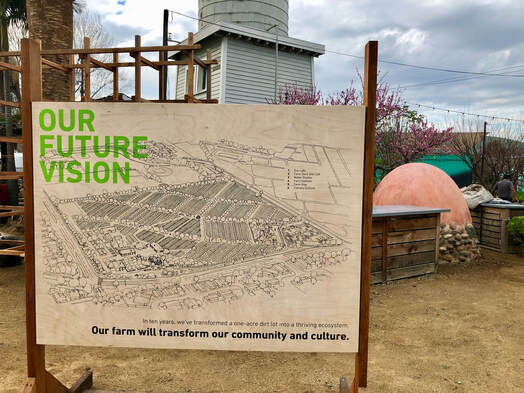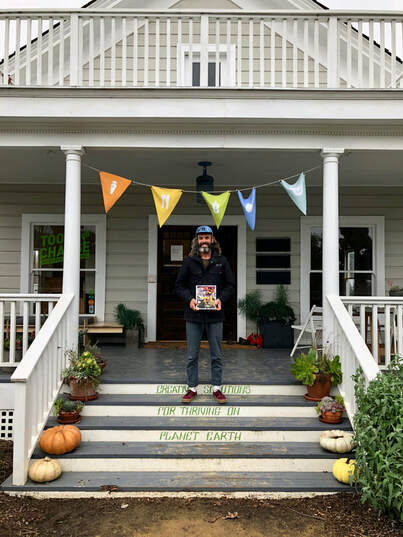The Ecology Center

What drives you? Whether your passion manifests in increasing local food access, preserving farmland from development, providing straw bale housing for low-income families, or reducing the waste stream, it started somewhere. Perhaps you had a serious health scare as a child and now want to prevent that for others. Or maybe you witnessed farmland surrounding your hometown get eaten up by concrete and monocultured subdivisions. Whatever it is, it ignited with a spark. For Evan Marks, founder of The Ecology Center, that spark was surfing.
Evan grew up in Orange County, California. Through surfing, he often saw and started picking up trash on the beach as a teenage volunteer, at which point he began understanding the negative impacts humans were having on the environment. He then discovered the number one negative impact on ocean health globally: Agriculture. This discover led Evan down a path to sustainable agriculture and a degree at U.C. Santa Cruz in Agroecology. After farming for a year on a homestead in Santa Cruz, Evan wound up in Latin America for seven years designing large-scale permaculture sites. His role as an ecological designer in Costa Rica resulted in creation of agroecosystems on diverse sites ranging in scale from 1,000-acre corridors to eco-villages and community farms.
After Costa Rica, Evan began doing similar ecological restoration work in South Africa for USAID, but he felt a calling home to Orange County. People need more ecological literacy everywhere. In his words, “I decided to come back to where I came from in this community of consumerism and cul-de-sacs. We need more ecological literacy and a real strong point of reference – what does that look like, what does that taste like…The design challenge is how do we take these fairly universal but also fairly obscure ideas of humans living in harmony with nature to the masses…we have to use design as a tool.”
 In an empty 140-year-old farmhouse on a one-acre lot of broken concrete with a palm tree and one citrus tree, Evan began using design as a tool in Orange County, founding The Ecology Center. Over the past 10 years, he has been building community around agroecology. One way Evan embraces his entire community is through careful consideration of inclusive language. “We’ve pulled a lot of the traditional language and lexicon of permaculture out of all of our work by design because this is for everyone, it’s not a clique. This organization is designed for the most amount of people, so we don’t need to have it feel exclusive.” Evan is very familiar with permaculture. He has taught 15 permaculture courses. According to him, “I love it, I’m in it, and, I’m less impressed by the insular-ness of it.” When considering permaculture, he clarified “it’s actually not a series of techniques and technologies, it’s a philosophy. The manifestation of the work is not in a garden, but it can be.”
In an empty 140-year-old farmhouse on a one-acre lot of broken concrete with a palm tree and one citrus tree, Evan began using design as a tool in Orange County, founding The Ecology Center. Over the past 10 years, he has been building community around agroecology. One way Evan embraces his entire community is through careful consideration of inclusive language. “We’ve pulled a lot of the traditional language and lexicon of permaculture out of all of our work by design because this is for everyone, it’s not a clique. This organization is designed for the most amount of people, so we don’t need to have it feel exclusive.” Evan is very familiar with permaculture. He has taught 15 permaculture courses. According to him, “I love it, I’m in it, and, I’m less impressed by the insular-ness of it.” When considering permaculture, he clarified “it’s actually not a series of techniques and technologies, it’s a philosophy. The manifestation of the work is not in a garden, but it can be.”
Instead of potentially limiting terminology, Evan is aiming to simply show people through engagement “this is what an ecosystem looks like in this climate, and this is what a community looks like at the table.” And after a decade, his one-acre agroecosystem has recently grown with the incorporation of 28 acres of farmland surrounding the original site. Following a fundraising campaign, Evan is excited to put his experience and passion to work. The redesign of the surrounding farmland will involve a strong integration of nature. He will incorporate native hedgerows bisecting the farm to provide habitat and forage. Perpendicular to those will be agroforestry operations called alley cropping. A hundred varieties of fruit trees will be grown with flowers, fruits and vegetables in between that involve a rotation of cover crops and animal grazing. Evan is planning on 40 varieties of citrus alone, and 20 varieties of apples and pears. Through this design he is creating redundancy. The site will provide Community experiences through U-pick, a restaurant café, farm stand, value-added products, and a farm share CSA. With this growth and funding campaign recently launched to finance it, he has chosen the inclusive and broad-reaching name “Institute of Food, Agriculture and the Arts.” On his one-acre site, The Ecology Center already operates as an institute of food, agriculture, and the arts. They have mentored over 100 schools in their food lab – providing hands-on experience of the harvesting, cleaning, preparing, eating, and composting life cycle. They also host farm dinners with numerous talented local chefs. It’s no wonder celebrity chefs like Alice Waters have come to see and cook at the site.
In an impressive step to further ripple out their work to the community, The Ecology Center partners with developers as consultants on ecological community design and they work with school districts and municipalities. They have opened opportunities for leadership development with the underserved population -part of their charter. This allows for those who otherwise would never get to work with the best chefs and the best farmers to do so. In referring to this focus on underserved youth, Evan rhetorically asked “How do we start to expand the polyculture of culture in permaculture?” Going back to redundancy, in empowering youth to practice agroecology, developers and school districts provide land to literally grow the movement. There are two sister sites of The Ecology Center now, 10 acres on school district property providing food for nine elementary schools and another 10 an hour south of the main site.
In the world of permaculture, it can become quite comfortable to stop at teaching Permaculture Design Certifications. I asked Evan why he moved beyond focusing on teaching those and he said “I just have a much bigger vision for the world…you can tell people things all day long but if they don’t touch it, taste it, it doesn’t actually mean a difference…it doesn’t change your behavior if you haven’t actually done it. So this place becomes a place where people can do it on their own terms.” Show them, not tell them what change looks like. And it works. At his site, I tasted the most delicious carrots and greens. And the strawberries were love at first bite. They were the size of most farmed strawberries, but the flavor sent my mind to the wild strawberries I grew up eating in the forests surrounding my childhood home in southern Ontario.
Although it isn’t in his public Lexicon, Evan clarified “I love permaculture. Because what is permaculture? Permaculture is care for the earth, care for people, and redistribution of the surpluses. That sounds exactly what humans need to be doing.” This relates to his goal of what people would take away with them when they leave the site, a positively reinforcing and addictive feeling “that there’s infinite possibility for humanity.”
To discover more about Evan and The Ecology Center, visit: https://www.theecologycenter.org/

Recent Posts

